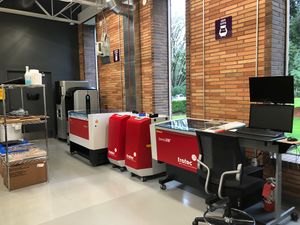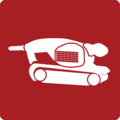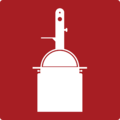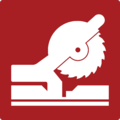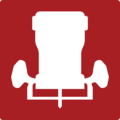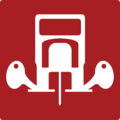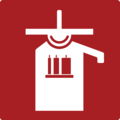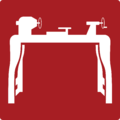Difference between revisions of "Wood Shop"
| Line 104: | Line 104: | ||
* Welding takes lots of practice so don't be afraid to ask for help. | * Welding takes lots of practice so don't be afraid to ask for help. | ||
| − | |||
| − | |||
| − | |||
| − | |||
| − | |||
| − | |||
| − | |||
| − | |||
| − | |||
Revision as of 14:33, 18 June 2020
The wood shop is a 975 square foot space. It contains a table saw, radial arm miter saw, planer, jointer, drill press, bandsaw, scroll saw, oscillating spindle sander, combination belt and disc sander, lathe, and other hand tools. It also contains a large CNC router. The shop is also equipped with compressed air quick connections for powering tools and machines. There are two air filtration units located up high in the ceiling. When producing wood dust turn on the filtration units with the white remote control. Theses do a good job of removing a large percentage of the wood dust from the air.
The current Ace of the Wood Shop is ' ().
Schedule
View the most up-to-date Wood Shop schedule on this Google Sheet.
Equipment Overview
| Name | Company | Model | Current Ace ⠉ |
|---|---|---|---|
| Belt Sander | Rigid | R2740 | Needed |
| Belt/Disc Sander | PowerMatic | BD31A | Needed |
| CNC Router | Laguna | SmartShop II | Needed |
| Compound Miter Saw | Dewalt | DWS780 | Needed |
| Hand Router | Porter Cable | 8902 | Needed |
| Handheld CNC Router | Shaper | S01-NN Origin | Needed |
| Jointer | Powermatic | 54HH | Needed |
| Oscillating Spindle Sander | Grizzly Industrial | G1071 | Needed |
| Planer | Powermatic | 209HH-3 | Needed |
| Power Carver | Foredom | SR - K5200 Deluxe | Needed |
| Router Table | SawStop/Bora Portamate Motor | RT-LFT 4-Post | Needed |
| Scroll Saw | Excalibur | EX-21 | Needed |
| Table Saw | SawStop | PCS31230 | Needed |
| Vertical Wood Bandsaw | Laguna | mband 14BX220-250 | Needed |
| Wood Drill Press | Tekna Tool | Nova Voyager DVR | Needed |
| Wood Lathe | TeknaTool | Nova Galaxi DVR | Needed |
3 commandments
1. Safety First
Safety First is the rule we hold highest of the three. This rule applies to both the safety of you as well as others
Keeping yourself safe in the Wood Shop is very important, as there are possibilities for accidents if you don't follow the safety guidelines. Safety starts with you so don't depend on others to keep you safe. There is a first aid kit located on the south wall near the Wood Shop door.
The following rules must be followed at all times.
All the same safety rules from the machine shop apply:
- Safety glasses must be worn when crossing into the shop area marked on the floor.
- No horseplay in the shop.
- Don’t do anything distracting to yourself or others while operating machinery.
- Do not wear any loose clothing, jewelry, or landyards.
- No hats or open toed shoes.
- Hair will not extend bellow the collar.
- Do not wear gloves while operating machinery.
- Food or drink is allowed when not operating machinery and it is kept a safe distance away from the machines.
- Do not attempt to operate machinery in the shop that you have not been certified on by GFU engineering personnel.
- Do not argue with volunteers or shop staff. Contact Justin Johnson if you have issues that need to be resolved.
- Do not operate machinery without a shop supervisor or trained volunteer in the shop with you. Never operate equipment alone in the shop.
- Reset the space. Make the area you are working in ready for the next person using the dust broom and vacuum cleaner.
- The first aid kit is located in the machine shop, next to the wood shop doors.
- If you see a safety violation inform the person immediately and encourage them to comply with the policies
- Don’t do anything that would require an additional rule to be added to this list.
2. Reset the Space
The Machine Shop has a specific organization to it. Put whatever you use back where it belongs. There is a place for everything and everything has a place. This rule applies to everything in the space. If you use a tool, put it back. If you use a pen, put it back. Throw away your trash and recycling.
Now, we understand that sometimes you need to leave projects out. Maybe you are in the middle of a large project and you need something left overnight. In cases like this, it is okay, but you NEED to make prior arrangements with Nick or Justin.
Please put back the Machinery the way you found it. Clean up chips and any messes you make. NEVER use shop air to clean off yourself or the machines.
Always put any unused materials back on the storage shelf, and throw away unusable scrap.
Always leave the space better than you found it.
3. Be Professional
This commandment has two sides to it. It covers the idea of acting like professional (which Webster’s defines as “exhibiting a courteous, conscientious, and generally businesslike manner in the workplace”). The term also describes the standards of education and training that prepare members of the profession with the particular knowledge and skills necessary to perform their specific role within that profession. Hopefully, you are learning both of these as part of your education at George Fox University. In the Welding Lab we expect you to develop as a courteous, conscientious, and skilled craftsman, understanding the tools and equipment in the Maker Hub and how to use them effectively.
Being a professional has some obvious ramifications in terms of behavior. First, be Christlike. Think of others better than yourselves. Share. If you have been welding for a prolonged time and someone else is waiting for the machine, let them use the machine for a while. This is being a professional.
If you are learning to how to use a machine, and you can't something to work the way you want - ASK SOMEONE! Learn! Become a professional. Learn the craft. This is an educational space. You might think it will be quick and you can just get it done “your” way and not learn how to do it correctly. Be a Professional and learn the proper way, and then be available to teach others.
One very important, and likely difficult part of being a professional is to correct others when they are not being professional. It is your responsibility to speak up when you see somebody doing something inappropriate. If you see somebody doing something unsafe, not resetting the space, or being unprofessional, the professional thing to do is to remind them of the three commandments and ask them politely to correct their action. This is OUR space, not any individual's. As a group, we expect everyone in the space to keep the space safe, clean, and operable for everyone.
If someone acts disgracefully unprofessional to you in the Machine Shop, you are welcome to bring the issue to Justin or Nick's attention.
General Wood Shop Knowledge
Welding is the process of joining metals together. It is a form of additive manufacturing. There are several different types of welding, and the Welding Lab uses most of these including spot welding.
In the Welding Lab, metals are joined together using MIG (Metal Inert Gas), TIG (Tungsten Inert Gas), Stick and spot welding.
Each welder has its own special purpose and benefits. MIG is fast and much easier to learn than TIG welding. Spot welding is only used with sheet metal. TIG welding produces very clean welds and the heat is more confined to a smaller area. TIG will also allow you to weld very thin metals.
These are a few good steps to having a successful weld.
- Make sure the materials have no coatings. Welding of some coatings like galvanized metal can produce toxic fumes.
- Materials should be properly prepped and clean for best results.
- Make sure the process you are using is correct for your material type.
- Double check the weld settings and use a piece of scrap to practice before welding on your project.
- Only weld steel and aluminum. Do not attempt to weld unknown materials.
Here are a couple things to keep in mind:
- Material will be very hot after welding so always think before touching.
- Make sure the welder is properly grounded before attempting to weld.
- Never weld in wet clothes or around water.
- Never try to weld any type of tank that has ever held flammable liquids. This is very dangerous and can explode!
- Always check your welding hood settings prior to welding. (start with a darker setting and work your way down.
- Welding takes lots of practice so don't be afraid to ask for help.
Foxtale Certification
Before working with any of the equipment in the Wood Shop you will need to take the general lab quiz as well as the specific quiz for each machine you are trying to use. The enrollment code for all of the quizzes is MakerHub.
The wood shop is 975 sq. ft. and contains a table saw, radial arm miter saw, planer, jointer, drill press, bandsaw, scroll saw, oscillating spindle sander, combination belt and disc sander, lathe, and other hand tools. It also contains a large CNC router. The shop is also equipped with compressed air quick connections for powering tools and machines. There are two air filtration units located up high in the ceiling. When producing wood dust turn on the filtration units with the white remote control. Theses do a good job of removing a large percentage of the wood dust from the air.
Equipment
